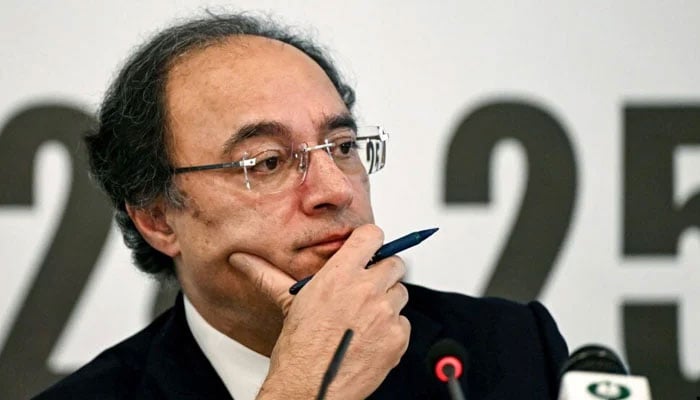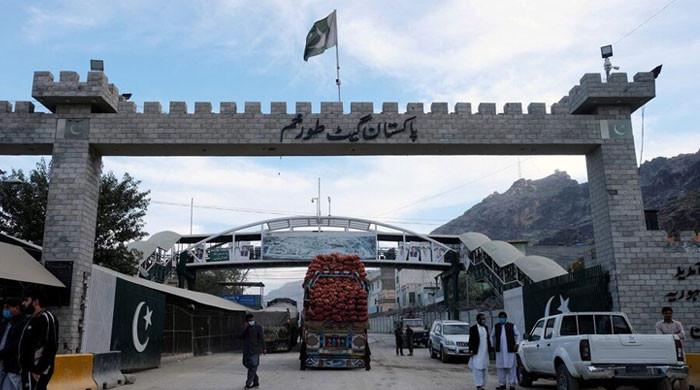Pakistan eyes tariff relief, looks to increase imports from US: Aurangzeb
Islamabad in talks with Washington to tear down non-trade barriers to open its markets to more US products, says minister
April 22, 2025

- Pakistan open to FDI from US firms, says finance minister.
- Says it’s bigger canvas that we're looking at engaging US.
- Minister says looking to buy more cotton, soybeans from US.
Minister for Finance and Revenue Senator Muhammad Aurangzeb has said Pakistan is looking to buy more goods from the US and remove non-tariff barriers to mitigate President Donald Trump's high tariffs.
The finance minister made the remarks while talking to Bloomberg News during his week-long trip to the US to participate in the spring meetings of the International Monetary Fund (IMF) and the World Bank.
He said Islamabad was in talks with Washington to tear down non-trade barriers to open its markets to more US products.
“It’s a bigger canvas that we are looking at in terms of engaging the US. We will constructively engage, and we will have a formal delegation coming in,” he added.
“Pakistan is open to foreign direct investments (FDI) from US firms and is preparing to debut its first-ever Panda bond in the range of $200m to $250m this year.”
The finance czar added that they were looking to buy more cotton and soybeans from the US. “We can also look at whether there are any issues with respect to non-tariff discussion, whether there are any onerous inspections at our end for US products, we can obviously view that,” he added.
He further stated that a trade delegation will also visit Washington in the coming months to bridge the trade gap. The minister said that authorities in Pakistan were trying to rebuild the country's tattered economy after it came close to a default in 2023 and had won an initial nod for a $2.3bn IMF loan that will give it funding visibility until 2027.
Aurangzeb said that Fitch also upgraded Pakistan's credit rating last week, citing confidence that Pakistan will be able to sustain reforms under the IMF loan program.
"What we are looking for is how we get away from a boom and bust cycle, which Pakistan has gone through and get on the sustainable growth path,” the minister added.
Trump, earlier this month, announced a 90-day pause on tariffs, saying he took the decision after more than 75 countries had reached out to negotiate and did not retaliate against the US. Earlier, he had imposed 29% tariffs on Pakistani exports to the US.
The imposition of reciprocal tariffs by US President Donald Trump on Pakistan’s products might disrupt exportable supplies in the range of $500 to $700 million at the maximum, some initial estimates suggest.
FinMin assures WB of govt’s commitment to sustainable economic stability
On the sidelines of the 2025 spring meetings of the international lenders in Washington, Aurangzeb held a productive meeting with World Bank Group President Ajay Banga.
The finance minister provided a detailed overview of Pakistan’s macroeconomic turnaround and reaffirmed the government’s unwavering commitment to ensuring sustainable economic stability, PID reported.
During the meeting, he expressed gratitude to the WB for its historical support to Pakistan and commended its leadership in developing a transformative CPF, a decade-long strategic roadmap centred around measurable impacts and outcomes. The minister appreciated the WB’s ongoing assistance in crafting a comprehensive implementation strategy and action plan to operationalise the CPF while simultaneously enhancing overall efficiency.
In his meeting with IMF Managing Director Kristalina Georgieva, Aurangzeb thanked the IMF team for reaching a staff-level agreement on the first review under the Extended Fund Facility (EFF) and a new arrangement under the Resilience and Sustainability Facility (RSF).
He reiterated the government of Pakistan’s commitment to maintaining the reform momentum and extended an invitation from PM Shehbaz for Georgieva to visit the country.











